人教版(2019)必修第一册Unit 4 Natural disasters Reading and Thinking课件(共30张PPT)
文档属性
| 名称 | 人教版(2019)必修第一册Unit 4 Natural disasters Reading and Thinking课件(共30张PPT) |
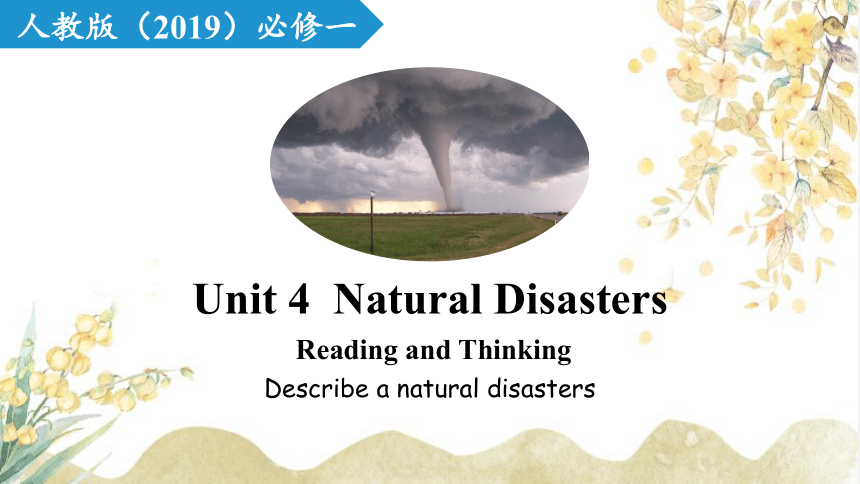
|
|
| 格式 | pptx | ||
| 文件大小 | 38.1MB | ||
| 资源类型 | 教案 | ||
| 版本资源 | 人教版(2019) | ||
| 科目 | 英语 | ||
| 更新时间 | 2024-11-13 00:00:00 | ||
图片预览

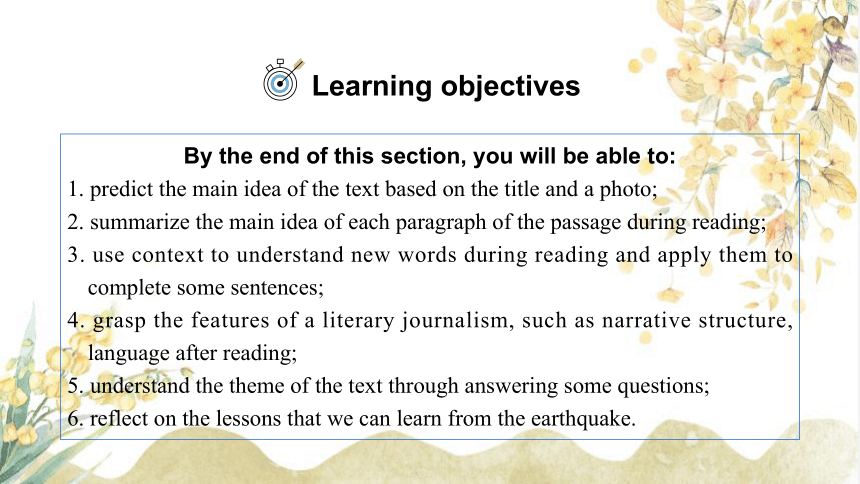
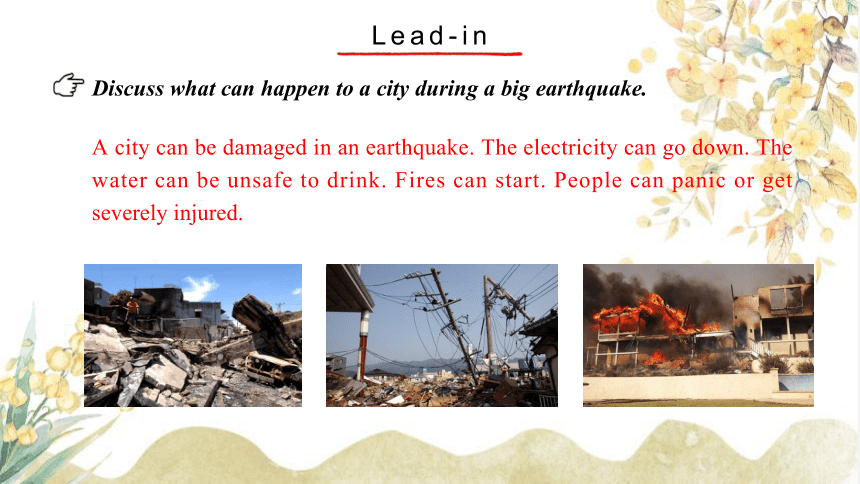
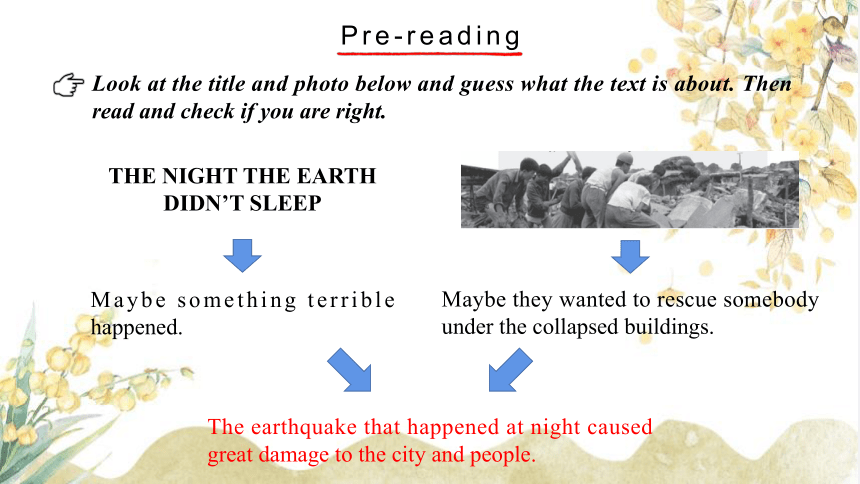
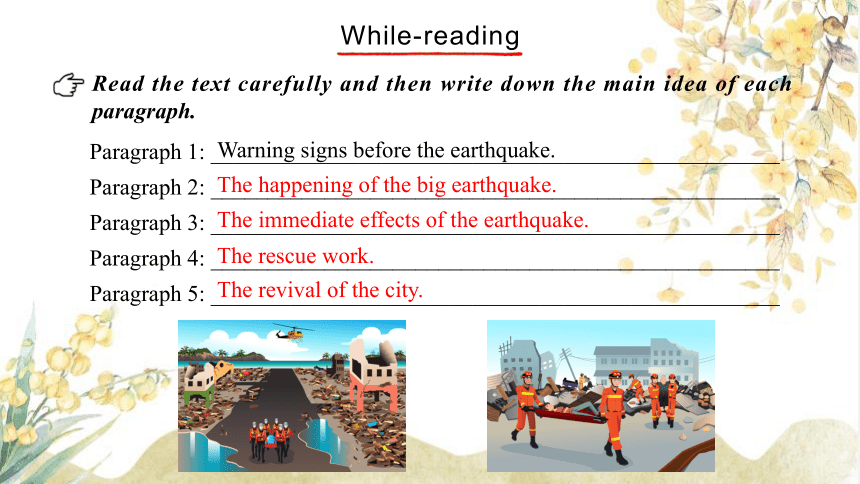
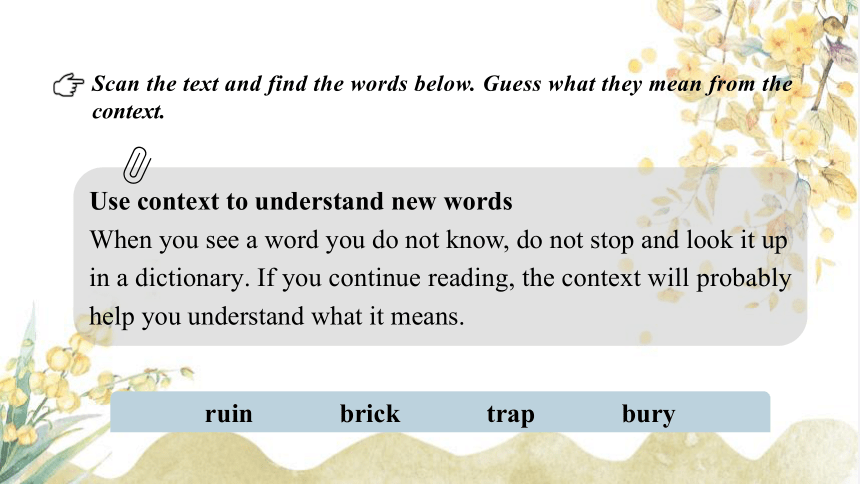
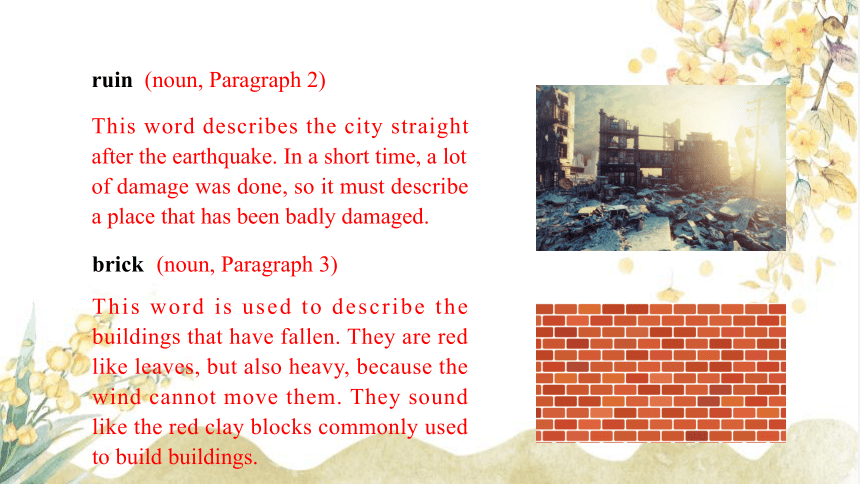
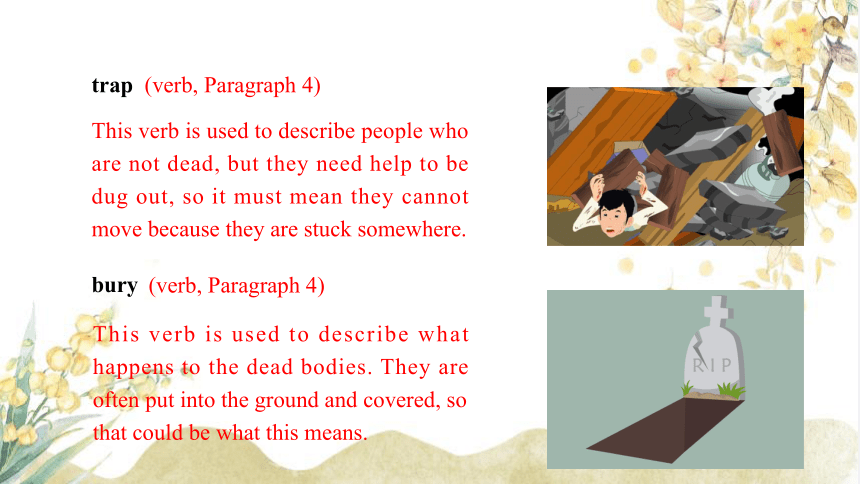
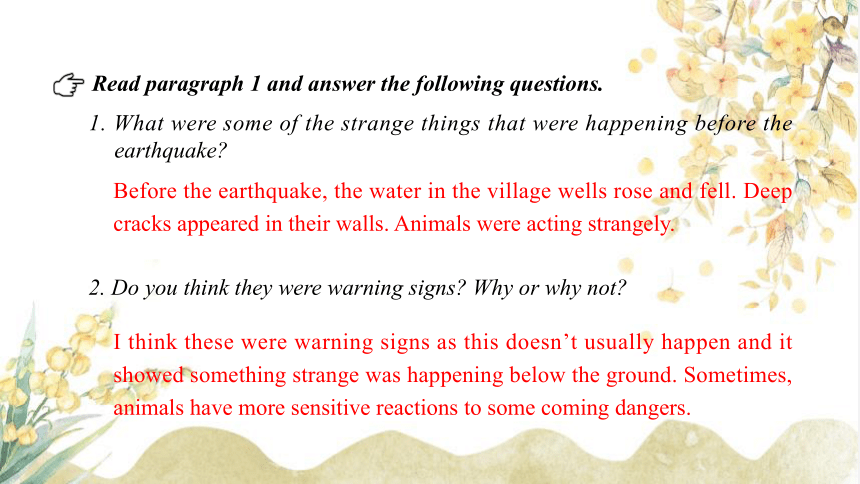
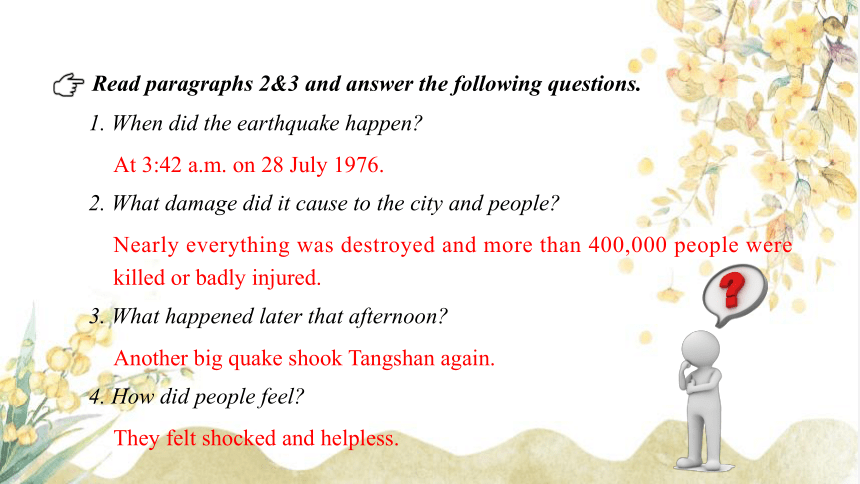
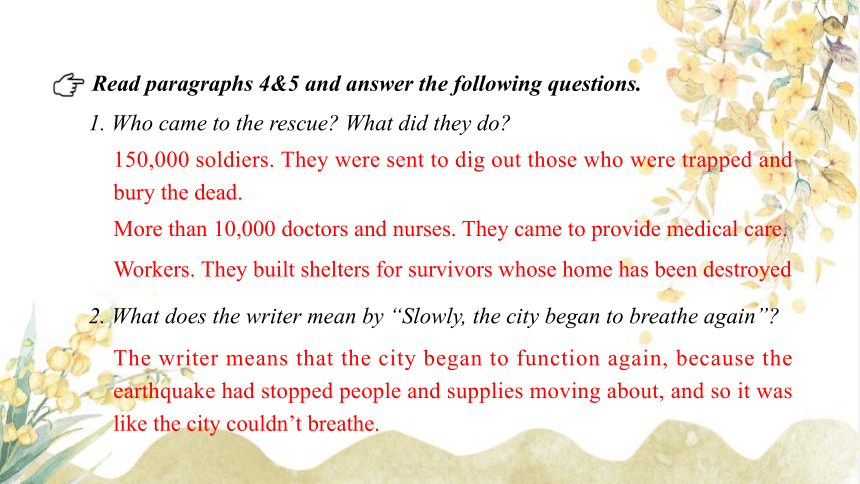
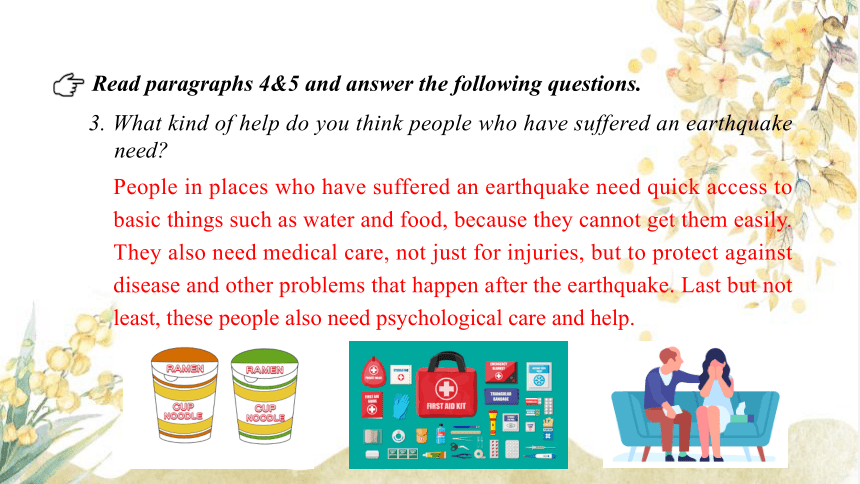
文档简介
(共30张PPT)
人教版(2019)必修一
Unit 4 Natural Disasters
Reading and Thinking
Describe a natural disasters
Learning objectives
By the end of this section, you will be able to:
1. predict the main idea of the text based on the title and a photo;
2. summarize the main idea of each paragraph of the passage during reading;
3. use context to understand new words during reading and apply them to complete some sentences;
4. grasp the features of a literary journalism, such as narrative structure, language after reading;
5. understand the theme of the text through answering some questions;
6. reflect on the lessons that we can learn from the earthquake.
Lead-in
Discuss what can happen to a city during a big earthquake.
A city can be damaged in an earthquake. The electricity can go down. The water can be unsafe to drink. Fires can start. People can panic or get severely injured.
Pre-reading
Look at the title and photo below and guess what the text is about. Then read and check if you are right.
THE NIGHT THE EARTH DIDN’T SLEEP
Maybe something terrible happened.
Maybe they wanted to rescue somebody under the collapsed buildings.
The earthquake that happened at night caused great damage to the city and people.
While-reading
Read the text carefully and then write down the main idea of each paragraph.
Paragraph 1: __________________________________________________
Paragraph 2: __________________________________________________
Paragraph 3: __________________________________________________
Paragraph 4: __________________________________________________
Paragraph 5: __________________________________________________
Warning signs before the earthquake.
The happening of the big earthquake.
The immediate effects of the earthquake.
The rescue work.
The revival of the city.
Scan the text and find the words below. Guess what they mean from the context.
Use context to understand new words
When you see a word you do not know, do not stop and look it up in a dictionary. If you continue reading, the context will probably help you understand what it means.
ruin brick trap bury
ruin
(noun, Paragraph 2)
This word describes the city straight after the earthquake. In a short time, a lot of damage was done, so it must describe a place that has been badly damaged.
brick
(noun, Paragraph 3)
This word is used to describe the buildings that have fallen. They are red like leaves, but also heavy, because the wind cannot move them. They sound like the red clay blocks commonly used to build buildings.
trap
(verb, Paragraph 4)
This verb is used to describe people who are not dead, but they need help to be dug out, so it must mean they cannot move because they are stuck somewhere.
bury
(verb, Paragraph 4)
This verb is used to describe what happens to the dead bodies. They are often put into the ground and covered, so that could be what this means.
Read paragraph 1 and answer the following questions.
1. What were some of the strange things that were happening before the earthquake
Before the earthquake, the water in the village wells rose and fell. Deep cracks appeared in their walls. Animals were acting strangely.
2. Do you think they were warning signs Why or why not
I think these were warning signs as this doesn’t usually happen and it showed something strange was happening below the ground. Sometimes, animals have more sensitive reactions to some coming dangers.
Read paragraphs 2&3 and answer the following questions.
1. When did the earthquake happen
At 3:42 a.m. on 28 July 1976.
2. What damage did it cause to the city and people
Nearly everything was destroyed and more than 400,000 people were killed or badly injured.
3. What happened later that afternoon
Another big quake shook Tangshan again.
4. How did people feel
They felt shocked and helpless.
Read paragraphs 4&5 and answer the following questions.
1. Who came to the rescue What did they do
150,000 soldiers. They were sent to dig out those who were trapped and bury the dead.
2. What does the writer mean by “Slowly, the city began to breathe again”
The writer means that the city began to function again, because the earthquake had stopped people and supplies moving about, and so it was like the city couldn’t breathe.
More than 10,000 doctors and nurses. They came to provide medical care.
Workers. They built shelters for survivors whose home has been destroyed
Read paragraphs 4&5 and answer the following questions.
3. What kind of help do you think people who have suffered an earthquake need
People in places who have suffered an earthquake need quick access to basic things such as water and food, because they cannot get them easily. They also need medical care, not just for injuries, but to protect against disease and other problems that happen after the earthquake. Last but not least, these people also need psychological care and help.
Read the sentences describing what happened after a huge plete the sentences with the correct forms of the new words and phrases from the text.
Post-reading
1. The huge earthquake left nearly the whole city __________.
2. Everyone was __________, thinking the world must be coming to an end.
3. Millions of people were left without water, food, or _________.
4. Soldiers and volunteers worked as hard as they could to pull away __________ and rocks, and rescue those who were _________ under the ruins.
5. Some were found alive, though they were suffering from terrible injuries, but others had already stopped __________ when they were discovered.
6. A few buildings were still standing, but people were afraid to use them as shelters, worrying they would be __________ if the buildings fell.
in ruins
in shock
electricity
bricks
trapped
breathing
buried
Work in groups. Discuss the questions.
1. What do you think helped in the revival of Tangshan city
I think the revival of Tangshan was helped by the strong support of the government and the people who all worked in unity to rebuild the city even better than before.
2. What other cities or towns have gone through similar changes What lessons can we learn from these events
Wenchuan county and some other towns near Wenchuan have the similar experiences. These towns were built up from the ruins. As well as developing better ways to detect and prepare for these disasters, we have learnt that acting quickly and in unity is the best way to get over such disasters. The strong support from government and people around are also very important.
Analyze the language features of the text.
1. Many sentences in the text give us a picture of the terrible earthquake in Tangshan. Which sentences impress you most Why
It seemed as if the world were coming to an end.
Bricks covered the ground like red autumn leaves.
Hard hills of rock became rivers of dirt.
The earth didn’t sleep.
The city began to breathe again.
simile
simile
metaphor
personification
personification
vivid
Analyze the language features of the text.
2. Numbers are widely used in the text. Why does the writer mention so many numbers
Eleven kilometres directly below the city, one of the most deadly earthquakes of the 20th century had begun, a quake that even caused damage more than 150 kilometres away in Beijing. Nearly one third of the whole nation felt it!
Because numbers will give accurate information and make the description more convincing.
Words and Expressions
In less than one minute, a large city lay in ruins. (P50)
在不到一分钟的时间里,一座大城市沦为废墟。
ruin / ru n/ n. & vt. 破坏;毁坏
搭配 in ruins 严重受损;破败不堪 fall into ruin 衰落,败落
ruin one’s health/fame/future 毁坏某人的健康/名誉/前途
例句
When they returned to the hometown the next day, they found their neighborhood in ruins. 第二天回到家乡的时候,他们发现他们的街区变成了废墟。
A large number of schools fell into ruin after the war.
战争过后,许多学校都毁了。
This mistake ruined his chances of getting the job.
这个错误断送了他得到那份工作的机会。
单词
1
People were in shock — and then, later that afternoon, another big quake shook
Tangshan again. (P50)
人们惊恐万状,然而临近傍晚时分,又一次强烈的地震撼动唐山。
shock / k/ n. 震惊;令人震惊的事;休克 vt. (使)震惊
搭配 in (a state of) shock 震惊,吃惊 give sb a shock 让某人吃惊
a great/terrible shock 令人非常震惊的事物/非常可怕的事物
例句
He’s still in a state of shock after witnessing the accident.
目睹了这场事故后,他至今还惊魂未定。
It will give him a shock when he knows how muck you’ve spent.
当他知道你花了多少钱时,他会大吃一惊的。
It was a great shock to hear that the factory would have to close.
听说工厂将被迫关闭,真是很震惊。
2
Soon after the quakes, the army sent 150,000 soldiers to Tangshan to dig out those
who were trapped and to bury the dead. (P50)
地震发生后不久,部队派出了15万名士兵奔赴唐山,将受困群众从废墟中抢救出
来,并掩埋了死者。
trap /tr p/
(1) vt. 使落入险境;使陷入圈套
搭配 be trapped in 困在……中,陷入……
trap sb into (doing) sth 诱使某人(做)某事
例句
The car was trapped in the deep snow.
汽车陷入了厚厚的积雪中。
The liar trapped me into believing his story.
这个骗子诱骗我相信他的故事。
3
Soon after the quakes, the army sent 150,000 soldiers to Tangshan to dig out those
who were trapped and to bury the dead. (P50)
地震发生后不久,部队派出了15万名士兵奔赴唐山,将受困群众从废墟中抢救出
来,并掩埋了死者。
trap /tr p/
(2) n. 险境;陷阱
搭配 lay/set a trap for 为……设下圈套 fall/walk into a trap 落入圈套
fall into the trap of doing sth 落入做某事的陷阱,陷入做某事的误区
例句
We set traps in the field for the mice. 我们在田里设下了老鼠夹子。
She had set a trap for the enemy and they walked straight into it.
她给敌人设下了圈套,他们就径直钻了进去。
I fell into the trap of putting work before family. 我误以为工作比家庭重要。
3
Soon after the quakes, the army sent 150,000 soldiers to Tangshan to dig out those
who were trapped and to bury the dead. (P50)
地震发生后不久,部队派出了15万名士兵奔赴唐山,将受困群众从废墟中抢救出
来,并掩埋了死者。
bury / beri/ vt. 埋葬;安葬
搭配 bury ... in ... 把……埋到……里
bury one’s face in one’s hands 双手掩面
例句
All his family are buried in the same graveyard.
他的家人全都埋葬在同一个墓地里。
The dog buried its bone in the garden. 狗把骨头埋在了花园里。
She buried her face in her hands and wept when she heard the bad news.
当她听到那个坏消息时,她掩面而泣。
3
With strong support from the government and the tireless efforts of the city’s people, ...
(P50) 有了来自政府的大力支持以及唐山人民的不懈努力,……
effort / ef t/ n. 努力;艰难的尝试;尽力
搭配 make an effort/make efforts 做出努力
make every effort to do sth = spare no effort to do sth 尽全力做某事
without effort 毫不费力地
例句
What’s the point, in your opinion, of helping him if he doesn’t make an effort to help himself 如果他自己不努力,那你觉得帮他又有什么用呢?
He spared no effort to make her happy again.
为使她重新快乐起来,他想尽了办法。
He lifted the big rock without effort. 他毫不费力地举起了这块大石头。
4
Some were found alive, though they were suffering from terrible injuries, ... (P51)
一些人被发现还活着,尽管受了重伤,……
suffer / s f / vt. 遭受;蒙受 vi. (因疾病、痛苦、悲伤等)受苦
搭配 suffer from 遭受……
例句
Though he is only 15, he suffers much pain. 尽管他才15岁,却遭受了很多痛苦。
The factory suffered serious damage in the fire. 那个工厂在火灾中损失惨重。
She has been suffering from the loss of memory since she had that car accident.
自从那次车祸以来,她便患了失忆症。
拓展 suffer n. 受苦者,受难者,患病者 suffering n. 疼痛,折磨
例句
This war has caused widespread human suffering.
这场战争给许许多多的人带来了苦难。
5
It seemed as if the world were coming to an end! (P50)
仿佛世界末日即将来临!
*as if引导从句的用法
句式剖析
本句为主从复合句。as if是连接词,引导表语从句。
考点提炼
as if意为“似乎,好像”,可以引导表语从句和方式状语从句。其意义和用法与as though相同。
(1) 引导表语从句,常置于系动词look,seem,sound,feel,smell等之后。
Listen to the thunder! It seems as if it is going to rain. 听雷声!看来似乎要下雨了。
It looks as if she’s gone away for a few days. 看起来她好像已经出去几天了。
(2) 引导方式状语从句,常置于行为动词之后。
He opened his mouth as if he would say something. 他张开嘴似乎要说什么。
句型
1
(3) as if/as though引导的从句的语气:
① 如果从句所表示的情况有明显的依据或实现的可能性较大,那么从句就用陈述语气;
② 如果从句所表示的情况没有依据,只是表达一种假设、愿望、怀疑或推测,那么就用虚拟语气。下表为表示虚拟的情况:
He talks as if he knew everything about it.
他讲起话来就好像关于此事他什么都知道似的。(与现在事实相反)
He went on working as if nothing had happened.
他继续工作,仿佛什么都没有发生。(与过去事实相反)
It seems as if the meeting would never end. 会议似乎永远也开不完。(与将来事实相反)
as if/as though 引导的从句 虚拟情况 从句谓语
与现在事实相反 一般过去时(be动词一般用were)
与过去事实相反 过去完成时
与将来事实相反 would/might/could+动词原形
Workbook
Match each word with its definition.
electricity volcano flood landslide drought shelter
1. __________: a long period of time with little or no rain
2. __________: the falling of a lot of earth and rocks down a mountain
3. __________: a large amount of water overflowing and causing a lot of damage
4. __________: a form of power for lighting heating, machines, etc.
5. __________: a mountain from which gas, ash, and hot rocks sometimes burst out
6. __________: a place built to give protection, especially from danger or bad weather
drought
landslide
flood
electricity
volcano
shelter
Complete the passage with the correct forms of the words below.
death destroy survive crash shelter disaster
Earthquakes are a form of natural ________. They are so powerful that they can cause tall buildings to ________ to the ground in just a few seconds. In fact, most of the ________ in an earthquake are caused by falling houses or buildings. New research data from earthquake zones is helping architects to design safer buildings that will not be _________ during an earthquake. Instead of being fixed in place like most ordinary buildings, the new buildings they have designed can move. Other researchers have designed small round houses that will not fall down when there is a quake. Because the houses are round, they can ________ strong winds and floods, and are good ________ during a disaster.
The photo below shows a special earthquake-proof house in Sichuan, China. Do you have any other ideas to make houses safer
disasters
crash
deaths
destroyed
survive
shelters
Write an article to summarize the process of the Tangshan earthquake and share your feelings about the earthquake.
Practise the words and expressions learned this class.
Homework
人教版(2019)必修一
Unit 4 Natural Disasters
Reading and Thinking
Describe a natural disasters
Learning objectives
By the end of this section, you will be able to:
1. predict the main idea of the text based on the title and a photo;
2. summarize the main idea of each paragraph of the passage during reading;
3. use context to understand new words during reading and apply them to complete some sentences;
4. grasp the features of a literary journalism, such as narrative structure, language after reading;
5. understand the theme of the text through answering some questions;
6. reflect on the lessons that we can learn from the earthquake.
Lead-in
Discuss what can happen to a city during a big earthquake.
A city can be damaged in an earthquake. The electricity can go down. The water can be unsafe to drink. Fires can start. People can panic or get severely injured.
Pre-reading
Look at the title and photo below and guess what the text is about. Then read and check if you are right.
THE NIGHT THE EARTH DIDN’T SLEEP
Maybe something terrible happened.
Maybe they wanted to rescue somebody under the collapsed buildings.
The earthquake that happened at night caused great damage to the city and people.
While-reading
Read the text carefully and then write down the main idea of each paragraph.
Paragraph 1: __________________________________________________
Paragraph 2: __________________________________________________
Paragraph 3: __________________________________________________
Paragraph 4: __________________________________________________
Paragraph 5: __________________________________________________
Warning signs before the earthquake.
The happening of the big earthquake.
The immediate effects of the earthquake.
The rescue work.
The revival of the city.
Scan the text and find the words below. Guess what they mean from the context.
Use context to understand new words
When you see a word you do not know, do not stop and look it up in a dictionary. If you continue reading, the context will probably help you understand what it means.
ruin brick trap bury
ruin
(noun, Paragraph 2)
This word describes the city straight after the earthquake. In a short time, a lot of damage was done, so it must describe a place that has been badly damaged.
brick
(noun, Paragraph 3)
This word is used to describe the buildings that have fallen. They are red like leaves, but also heavy, because the wind cannot move them. They sound like the red clay blocks commonly used to build buildings.
trap
(verb, Paragraph 4)
This verb is used to describe people who are not dead, but they need help to be dug out, so it must mean they cannot move because they are stuck somewhere.
bury
(verb, Paragraph 4)
This verb is used to describe what happens to the dead bodies. They are often put into the ground and covered, so that could be what this means.
Read paragraph 1 and answer the following questions.
1. What were some of the strange things that were happening before the earthquake
Before the earthquake, the water in the village wells rose and fell. Deep cracks appeared in their walls. Animals were acting strangely.
2. Do you think they were warning signs Why or why not
I think these were warning signs as this doesn’t usually happen and it showed something strange was happening below the ground. Sometimes, animals have more sensitive reactions to some coming dangers.
Read paragraphs 2&3 and answer the following questions.
1. When did the earthquake happen
At 3:42 a.m. on 28 July 1976.
2. What damage did it cause to the city and people
Nearly everything was destroyed and more than 400,000 people were killed or badly injured.
3. What happened later that afternoon
Another big quake shook Tangshan again.
4. How did people feel
They felt shocked and helpless.
Read paragraphs 4&5 and answer the following questions.
1. Who came to the rescue What did they do
150,000 soldiers. They were sent to dig out those who were trapped and bury the dead.
2. What does the writer mean by “Slowly, the city began to breathe again”
The writer means that the city began to function again, because the earthquake had stopped people and supplies moving about, and so it was like the city couldn’t breathe.
More than 10,000 doctors and nurses. They came to provide medical care.
Workers. They built shelters for survivors whose home has been destroyed
Read paragraphs 4&5 and answer the following questions.
3. What kind of help do you think people who have suffered an earthquake need
People in places who have suffered an earthquake need quick access to basic things such as water and food, because they cannot get them easily. They also need medical care, not just for injuries, but to protect against disease and other problems that happen after the earthquake. Last but not least, these people also need psychological care and help.
Read the sentences describing what happened after a huge plete the sentences with the correct forms of the new words and phrases from the text.
Post-reading
1. The huge earthquake left nearly the whole city __________.
2. Everyone was __________, thinking the world must be coming to an end.
3. Millions of people were left without water, food, or _________.
4. Soldiers and volunteers worked as hard as they could to pull away __________ and rocks, and rescue those who were _________ under the ruins.
5. Some were found alive, though they were suffering from terrible injuries, but others had already stopped __________ when they were discovered.
6. A few buildings were still standing, but people were afraid to use them as shelters, worrying they would be __________ if the buildings fell.
in ruins
in shock
electricity
bricks
trapped
breathing
buried
Work in groups. Discuss the questions.
1. What do you think helped in the revival of Tangshan city
I think the revival of Tangshan was helped by the strong support of the government and the people who all worked in unity to rebuild the city even better than before.
2. What other cities or towns have gone through similar changes What lessons can we learn from these events
Wenchuan county and some other towns near Wenchuan have the similar experiences. These towns were built up from the ruins. As well as developing better ways to detect and prepare for these disasters, we have learnt that acting quickly and in unity is the best way to get over such disasters. The strong support from government and people around are also very important.
Analyze the language features of the text.
1. Many sentences in the text give us a picture of the terrible earthquake in Tangshan. Which sentences impress you most Why
It seemed as if the world were coming to an end.
Bricks covered the ground like red autumn leaves.
Hard hills of rock became rivers of dirt.
The earth didn’t sleep.
The city began to breathe again.
simile
simile
metaphor
personification
personification
vivid
Analyze the language features of the text.
2. Numbers are widely used in the text. Why does the writer mention so many numbers
Eleven kilometres directly below the city, one of the most deadly earthquakes of the 20th century had begun, a quake that even caused damage more than 150 kilometres away in Beijing. Nearly one third of the whole nation felt it!
Because numbers will give accurate information and make the description more convincing.
Words and Expressions
In less than one minute, a large city lay in ruins. (P50)
在不到一分钟的时间里,一座大城市沦为废墟。
ruin / ru n/ n. & vt. 破坏;毁坏
搭配 in ruins 严重受损;破败不堪 fall into ruin 衰落,败落
ruin one’s health/fame/future 毁坏某人的健康/名誉/前途
例句
When they returned to the hometown the next day, they found their neighborhood in ruins. 第二天回到家乡的时候,他们发现他们的街区变成了废墟。
A large number of schools fell into ruin after the war.
战争过后,许多学校都毁了。
This mistake ruined his chances of getting the job.
这个错误断送了他得到那份工作的机会。
单词
1
People were in shock — and then, later that afternoon, another big quake shook
Tangshan again. (P50)
人们惊恐万状,然而临近傍晚时分,又一次强烈的地震撼动唐山。
shock / k/ n. 震惊;令人震惊的事;休克 vt. (使)震惊
搭配 in (a state of) shock 震惊,吃惊 give sb a shock 让某人吃惊
a great/terrible shock 令人非常震惊的事物/非常可怕的事物
例句
He’s still in a state of shock after witnessing the accident.
目睹了这场事故后,他至今还惊魂未定。
It will give him a shock when he knows how muck you’ve spent.
当他知道你花了多少钱时,他会大吃一惊的。
It was a great shock to hear that the factory would have to close.
听说工厂将被迫关闭,真是很震惊。
2
Soon after the quakes, the army sent 150,000 soldiers to Tangshan to dig out those
who were trapped and to bury the dead. (P50)
地震发生后不久,部队派出了15万名士兵奔赴唐山,将受困群众从废墟中抢救出
来,并掩埋了死者。
trap /tr p/
(1) vt. 使落入险境;使陷入圈套
搭配 be trapped in 困在……中,陷入……
trap sb into (doing) sth 诱使某人(做)某事
例句
The car was trapped in the deep snow.
汽车陷入了厚厚的积雪中。
The liar trapped me into believing his story.
这个骗子诱骗我相信他的故事。
3
Soon after the quakes, the army sent 150,000 soldiers to Tangshan to dig out those
who were trapped and to bury the dead. (P50)
地震发生后不久,部队派出了15万名士兵奔赴唐山,将受困群众从废墟中抢救出
来,并掩埋了死者。
trap /tr p/
(2) n. 险境;陷阱
搭配 lay/set a trap for 为……设下圈套 fall/walk into a trap 落入圈套
fall into the trap of doing sth 落入做某事的陷阱,陷入做某事的误区
例句
We set traps in the field for the mice. 我们在田里设下了老鼠夹子。
She had set a trap for the enemy and they walked straight into it.
她给敌人设下了圈套,他们就径直钻了进去。
I fell into the trap of putting work before family. 我误以为工作比家庭重要。
3
Soon after the quakes, the army sent 150,000 soldiers to Tangshan to dig out those
who were trapped and to bury the dead. (P50)
地震发生后不久,部队派出了15万名士兵奔赴唐山,将受困群众从废墟中抢救出
来,并掩埋了死者。
bury / beri/ vt. 埋葬;安葬
搭配 bury ... in ... 把……埋到……里
bury one’s face in one’s hands 双手掩面
例句
All his family are buried in the same graveyard.
他的家人全都埋葬在同一个墓地里。
The dog buried its bone in the garden. 狗把骨头埋在了花园里。
She buried her face in her hands and wept when she heard the bad news.
当她听到那个坏消息时,她掩面而泣。
3
With strong support from the government and the tireless efforts of the city’s people, ...
(P50) 有了来自政府的大力支持以及唐山人民的不懈努力,……
effort / ef t/ n. 努力;艰难的尝试;尽力
搭配 make an effort/make efforts 做出努力
make every effort to do sth = spare no effort to do sth 尽全力做某事
without effort 毫不费力地
例句
What’s the point, in your opinion, of helping him if he doesn’t make an effort to help himself 如果他自己不努力,那你觉得帮他又有什么用呢?
He spared no effort to make her happy again.
为使她重新快乐起来,他想尽了办法。
He lifted the big rock without effort. 他毫不费力地举起了这块大石头。
4
Some were found alive, though they were suffering from terrible injuries, ... (P51)
一些人被发现还活着,尽管受了重伤,……
suffer / s f / vt. 遭受;蒙受 vi. (因疾病、痛苦、悲伤等)受苦
搭配 suffer from 遭受……
例句
Though he is only 15, he suffers much pain. 尽管他才15岁,却遭受了很多痛苦。
The factory suffered serious damage in the fire. 那个工厂在火灾中损失惨重。
She has been suffering from the loss of memory since she had that car accident.
自从那次车祸以来,她便患了失忆症。
拓展 suffer n. 受苦者,受难者,患病者 suffering n. 疼痛,折磨
例句
This war has caused widespread human suffering.
这场战争给许许多多的人带来了苦难。
5
It seemed as if the world were coming to an end! (P50)
仿佛世界末日即将来临!
*as if引导从句的用法
句式剖析
本句为主从复合句。as if是连接词,引导表语从句。
考点提炼
as if意为“似乎,好像”,可以引导表语从句和方式状语从句。其意义和用法与as though相同。
(1) 引导表语从句,常置于系动词look,seem,sound,feel,smell等之后。
Listen to the thunder! It seems as if it is going to rain. 听雷声!看来似乎要下雨了。
It looks as if she’s gone away for a few days. 看起来她好像已经出去几天了。
(2) 引导方式状语从句,常置于行为动词之后。
He opened his mouth as if he would say something. 他张开嘴似乎要说什么。
句型
1
(3) as if/as though引导的从句的语气:
① 如果从句所表示的情况有明显的依据或实现的可能性较大,那么从句就用陈述语气;
② 如果从句所表示的情况没有依据,只是表达一种假设、愿望、怀疑或推测,那么就用虚拟语气。下表为表示虚拟的情况:
He talks as if he knew everything about it.
他讲起话来就好像关于此事他什么都知道似的。(与现在事实相反)
He went on working as if nothing had happened.
他继续工作,仿佛什么都没有发生。(与过去事实相反)
It seems as if the meeting would never end. 会议似乎永远也开不完。(与将来事实相反)
as if/as though 引导的从句 虚拟情况 从句谓语
与现在事实相反 一般过去时(be动词一般用were)
与过去事实相反 过去完成时
与将来事实相反 would/might/could+动词原形
Workbook
Match each word with its definition.
electricity volcano flood landslide drought shelter
1. __________: a long period of time with little or no rain
2. __________: the falling of a lot of earth and rocks down a mountain
3. __________: a large amount of water overflowing and causing a lot of damage
4. __________: a form of power for lighting heating, machines, etc.
5. __________: a mountain from which gas, ash, and hot rocks sometimes burst out
6. __________: a place built to give protection, especially from danger or bad weather
drought
landslide
flood
electricity
volcano
shelter
Complete the passage with the correct forms of the words below.
death destroy survive crash shelter disaster
Earthquakes are a form of natural ________. They are so powerful that they can cause tall buildings to ________ to the ground in just a few seconds. In fact, most of the ________ in an earthquake are caused by falling houses or buildings. New research data from earthquake zones is helping architects to design safer buildings that will not be _________ during an earthquake. Instead of being fixed in place like most ordinary buildings, the new buildings they have designed can move. Other researchers have designed small round houses that will not fall down when there is a quake. Because the houses are round, they can ________ strong winds and floods, and are good ________ during a disaster.
The photo below shows a special earthquake-proof house in Sichuan, China. Do you have any other ideas to make houses safer
disasters
crash
deaths
destroyed
survive
shelters
Write an article to summarize the process of the Tangshan earthquake and share your feelings about the earthquake.
Practise the words and expressions learned this class.
Homework
